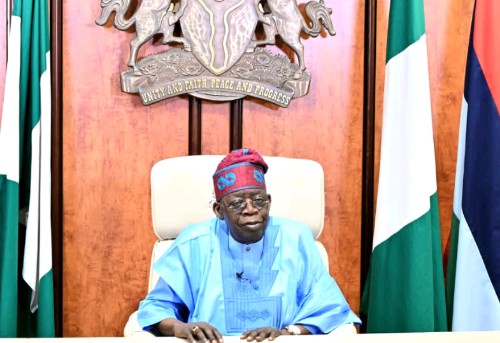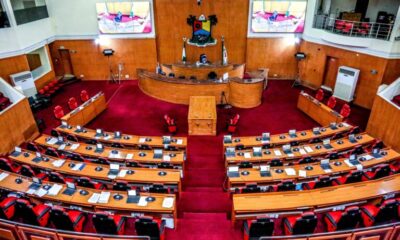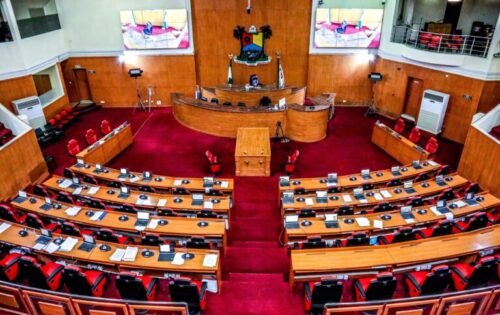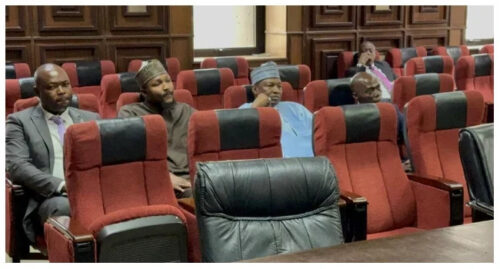The Department of State Services has arraigned former Attorney-General of the Federation, Abubakar Malami, and his son, Abdulazeez Malami, on five-count charges of terrorism financing and illegal firearm possession.
As reported by Channels Television on Tuesday, they were arraigned before Justice Joyce Abdumalik of the Federal High Court, Abuja.
In the charge filed before the Federal High Court in Abuja, Malami is also accused of refusing to prosecute suspected terrorism financiers, whose case files were handed to him while he served as the AGF and Minister of Justice.
Malami and Abdulaziz are equally accused of warehousing firearms in their residence at Gesse Phase II Area, Birain Kebbi LGA, Kebbi State, without lawful authority.
In count one of the charge, the DSS said the Former AGF with knowingly abetting terrorism financing, while the ex-AGF and his son are charged in counts two to five, with unlawful, possession of a Sturm Magnum 17-0101 firearm, 16 Redstar AAA 5720 live rounds of cartridges and 27 expended Redstar AAA 5’20 cartridges, contrary to and punishable under relevant Sections of Terrorism (Prevention and Prohibition) Act, 2022 and Firearms Act, 2004.
Malami and Abdulaziz pleaded not guilty when the counts in the charge sheet were read to them.
Shortly after they pleaded to the charge, prosecuting lawyer, Calistus Eze, prayed the court to order their remand in the custody of the DSS and fix a date for the commencement of trial.
Responding, defence lawyer Shuaibu Aruwan (SAN) orally applied for bail for the defendants, arguing that the defendants have been in DSS custody for over two weeks.
Justice Joyce Abdulmalik rejected the oral bail application, noting that her court is a court of record, and ordered the defence to file a formal application for bail.
She ordered that the defendants be remanded to the custody of the DSS and adjourned the matter till February 20 for the commencement of the trial.
Counts in the charge read:
“That you, Abubakar Malami of Gesse Phase II Area, Birnin Kebbi LGA, Kebbi State, Adult, male, sometime in November, 2022 at Federal Ministry of Justice, Maitama, Abuja, within the jurisdiction of this honourable court, did knowingly abet terrorism financing by refusing to prosecute terrorism financiers whose case files were brought to your office as the Attorney-General of the Federation, for prosecution, and thereby committed an offence contrary to and punishable under Section 26 (2) of Terrorism (Prevention and Prohibition) Act, 2022.
“Abubakar Malami and Abdulaziz Abubakar Malami of Gesse Phase II, Area, Birnin Kebbi LGA, Kebbi State, adults, males, sometime in December, 2025, in your res:dence at Gesse Phase II Area, Birnin Kebbi LGA, Kebbi State, within the jurisdiction of this Honourable Court, did engage in a conduct in preparation to commit act of terrorism by having in your possession and without licence, a Sturm Magnum 17-0101 firearm, Sixteen (16) Redstar AAA 5’20 live rounds of Cartridges and Twenty-Seven (27) expended Redstar AAA 5’20 Cartridges, and thereby committed an offence contrary to and punishable under Section 29 of Terrorism (Prevention and Prohibition) Act, 2022.
“That you, Abubakar Malami and Abdulaziz Abubakar Malami, of Gesse Phase II Area, Birnin Kebbi LGA, Kebbi State, adults, males, sometime in December 2025, in your residence at Gesse Phase II Area, Birnin Kebbi LGA, Kebbi State, within the jurisdiction of this honourable court, without la icence, did have in your possession a Sturm Magnum 17-0101 firearm, and thereby committed an offence contrary to Section 3 of the Firearms Act 2004 and punishable under Section 27 (1) of the same Act.
“That you, Abubakar Malami and Abdulaziz Abubakar Malami, of Gesse Phase II Area, Birnin Kebbi LGA, Kebbi State, adults, males, sometime in December, 2025, in your residence at Gesse Phase II Area, Birnin Kebbi LGA, Kebbi State, within the jurisdiction of this honourable court, without licence, did have in your possession sixteen (16) Redstar AAA 5’20 live rounds of cartridges, and thereby committed an offence contrary to Section 8(1) of Firearms Act 2004 and punishable under Section 27 (1) of the same Act.
“That you, Abubakar Malami and Abdulaziz Abubakar Malami, of Gesse Phase II Area, Birnin Kebbi LGA, Kebbi State, adults, males, sometime in December, 2025, in your residence at Gesse Phase II Area, Birnin Kebbi LGA, Kebbi State, within the jurisdiction of this honourable court, without licence, did have in your possession twenty-seven (27) expended Redstar AAA 5’20 cartridges, and thereby committed an offence contrary to Section 8(1) of Firearms Act 2004 and punishable under Section 27 (1) of the same Act.


 BUSINESS4 days ago
BUSINESS4 days ago
 ENTERTAINMENT2 days ago
ENTERTAINMENT2 days ago
 ENTERTAINMENT2 days ago
ENTERTAINMENT2 days ago
 BIG STORY1 day ago
BIG STORY1 day ago
 BUSINESS3 days ago
BUSINESS3 days ago
 BIG STORY2 days ago
BIG STORY2 days ago
 BIG STORY1 day ago
BIG STORY1 day ago
 BIG STORY19 hours ago
BIG STORY19 hours ago






















